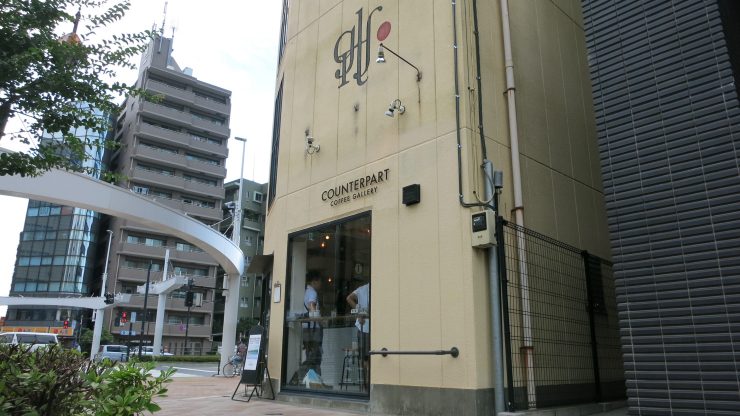
A friend sent me a message saying we should check out a new exhibition at Counterpart Coffee Gallery called “New Wabi-Sabi.” Truth was, I didn’t even know what wabi-sabi meant. Still, I’d heard good things about Counterpart, and I needed coffee—these were valid reasons to go.
I texted a friend while on the train and asked what wabi-sabi meant. “It’s not about extravagant expressions of beauty,” she replied, “but simplicity and quality. And in that, depth.”
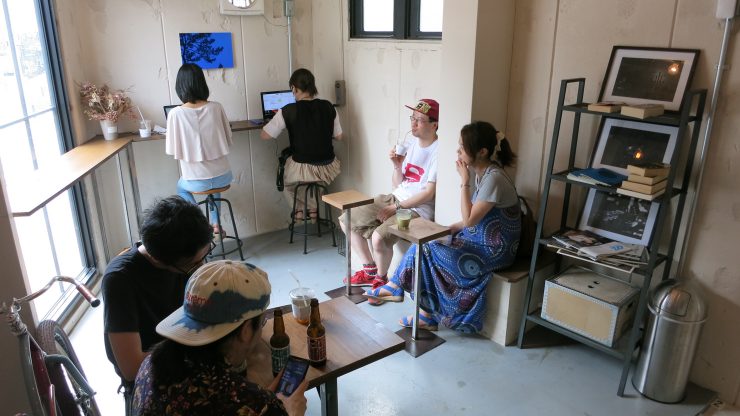
I gathered that it was a unique Japanese aesthetic, a worldview through which beauty lies in the imperfect. I looked at a few definitions in English. My favorite read: “Wabi-sabi nurtures all that is authentic by acknowledging three simple realities: nothing lasts, nothing is finished, and nothing is perfect.”
I liked this; it made me feel better about the failed cups of coffee I brewed each morning.
Counterpart Coffee Gallery is a three-story, faded-yellow building on the corner of an intersection in Nishi-Shinjuku. The Glitch Coffee symbol is painted high on an outside wall. Inside, Counterpart feels just like Glitch Coffee roasters in Jimbocho—white concrete walls, simple wooden tables and chairs, and naked lightbulbs hanging from the ceiling. It’s all very minimal, very lived-in, and strangely comforting.
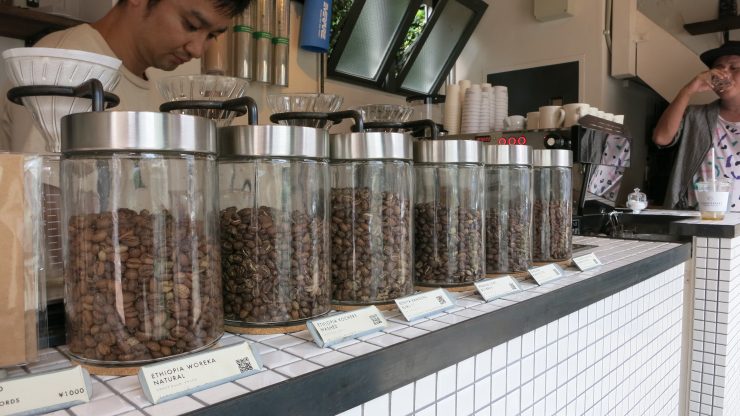
I ordered a coffee and asked manager Yuya Kosakada about the shop. He said the coffee is all Glitch, and the concept is lifestyle-centric.
“Music, photography, art, coffee: they’re all subcultures we want to link together. Coffee is a tool for communication, and we want to use it to connect people, and show them [other kinds] of lifestyles.”
Photographer Masayoshi Kusunaga sat at the counter. “New Wabi-Sabi” is his exhibition, and he offered to give me a tour. He told me the term wabi originated with a famous Japanese tea master, Sen no Rikyu, and developed into wabi-sabi through Matsuo Basho, a famous poet. Kusunaga said the connection to tea and ritual for traditional wabi-sabi made coffee a nice fit for a contemporary view of it.
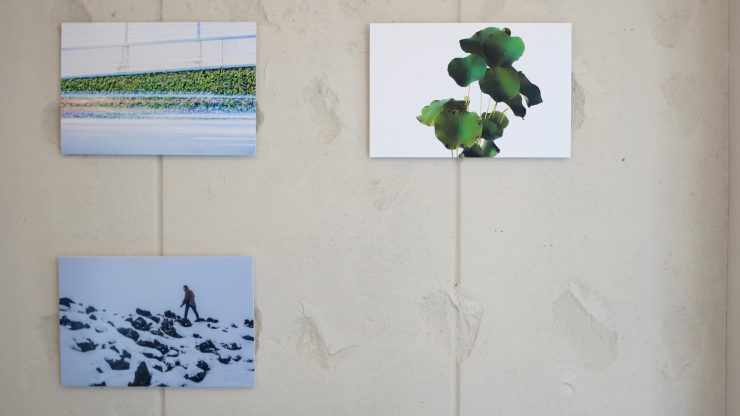
We went upstairs. At a small table, two men sipped at beer; another customer sat at a counter by the window, staring out at passing traffic. Kusunaga talked about the photos on the walls. He said that, though simple, the photography had hidden depth. In combination, the photographs told stories. It made me think of coffee—a simple drink on its own, you could still follow it down any number of different rabbit holes.
Kusunaga gestured at an image of a lotus leaf, and said, “You can see here the leaf is beginning to wither; it’s dying. This photo captures the moment a life hangs between two worlds.”
On the third floor, a narrow space of vintage sofas and small wooden tables, we stood before three pictures—a collection of carp streamers, a peaceful riverside, and a low-hanging moon. Kusunaga said the asymmetry was important. “Everything follows the same line,” he said, “and your imagination fills in the blanks. There’s a flow of time and life here: from day to night, and life to death.”
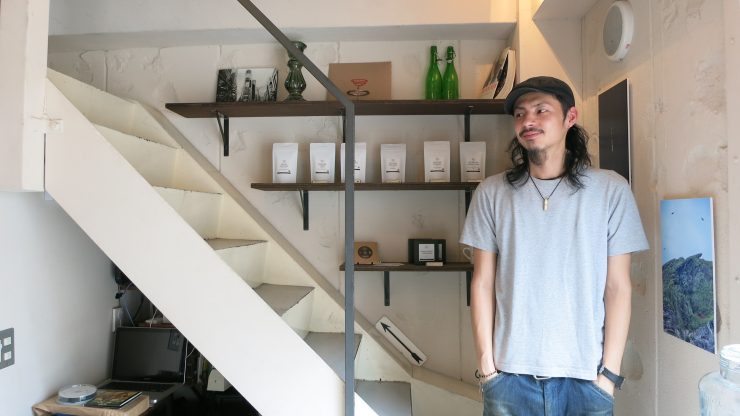
Yuya Kosakada
It was odd to think of the act of fading and disappearing as beautiful. Kusunaga said the Japanese are sensitive to beauty in impermanence; he said the sakura cherry blossom was a good example. “The beauty is in the fleeting nature of its bloom.”
Downstairs, while I sipped at an iced coffee, I mentioned to Kosakada that the photography captured moments not easily found outside Japan. He said he hopes future exhibitions and events also get at this idea—the sharing of culture and art unique to Japan. Counterpart is a gateway to that, he said, with coffee as the conduit. He pointed to a CD on the counter as an example—a collaboration between Counterpart and Madcore Records called Chill Mix, a light, mellow set of jazz, funk, and soul, designed as a companion to a similar style of coffee.
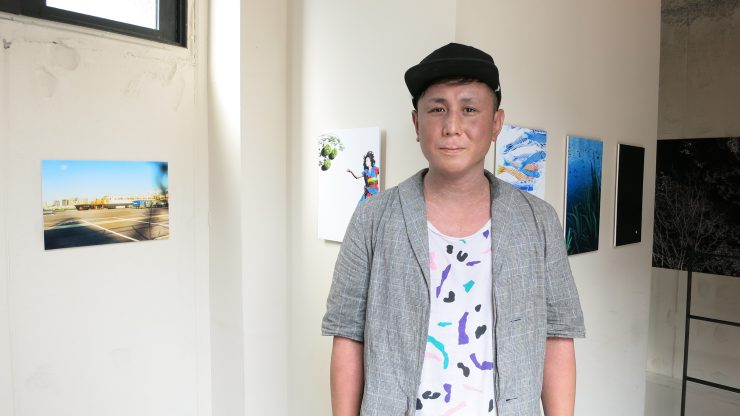
Masayoshi Kusunaga
It was intriguing to think of this coffee shop as a space for sharing and experiencing culture. In its own way, coffee is an extension of the tea ceremony, but for a new generation—one that wants its own way to express ideas and create art.
And what a cool idea, I thought, for a coffee shop to be a window into the art and culture of a generation.
It gave me reason to look forward to whatever exhibition Counterpart might hold next.
Hengtee Lim (@Hent03) is a Sprudge.com staff writer based in Tokyo. Read more Hengtee Lim on Sprudge.
The post Tokyo: Counterpart Coffee Gallery And The New Wabi-Sabi appeared first on Sprudge.
from RSSMix.com Mix ID 8200593 http://redirect.viglink.com?u=http%3A%2F%2Fsprudge.com%2Fcounterpart-coffee-gallery-104556.html%3Futm_source%3Drss%26utm_medium%3Drss&key=ddaed8f51db7bb1330a6f6de768a69b8
No comments:
Post a Comment